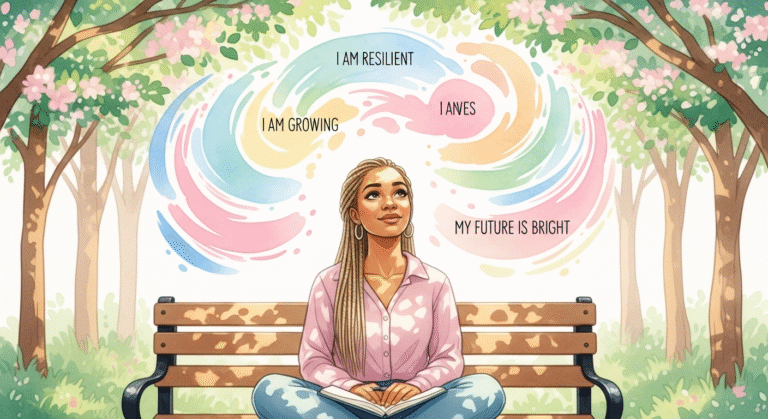Rebuilding Self-Esteem Post-Breakup: A Journey of Self-Discovery and Growth
Rebuilding Self-Esteem Post Breakup: Ending a relationship can deal a crushing blow to your confidence and self-image. When a source of affirmation and attachment suddenly disappears, feelings of rejection and deflation often arise. However, a breakup does not erase your worth or diminish the many wonderful qualities that make you who you are. With time, self-care, and the support of those who love you, you can regain and even surpass the self-assurance you felt before. This journey requires patience and compassion towards yourself. There will be ups and downs, but you have the inner resources to nurture your emotional wellbeing and emerge stronger.

Cultivating Positive Self-Talk: The Transformative Power of Your Inner Voice
The journey to rebuild self-esteem often begins with the dialogue we have within ourselves. In the aftermath of a breakup, it’s common for our inner voice to take a critical tone, focusing on perceived failures or shortcomings. However, transforming this inner voice into a source of compassion and support is key to healing and growth.
Affirmation Practice: Building a Foundation of Self-Encouragement
- Start each day by affirming your strengths and qualities. Stand in front of a mirror and speak positive affirmations out loud. Phrases like “I am worthy,” “I am capable of overcoming challenges,” or “I am deserving of happiness” can reinforce a positive self-image.
- Create a list of affirmations that resonate with your personal journey and repeat them daily. This practice nurtures a mindset that is conducive to healing and personal development.
Silencing the Inner Critic: Cultivating a Kinder Inner Dialogue
- Recognize when your inner critic takes over, often focusing on negatives or ruminating over past mistakes. Acknowledge these thoughts, but counter them with kindness and understanding. For instance, if you find yourself dwelling on a perceived failure, remind yourself of the learning and growth that came from that experience.
- Replace critical thoughts with compassionate ones. When you notice self-criticism, pause and reframe the thought in a kinder and more understanding way.
Celebrating Your Achievements: Honoring Your Resilience and Strengths
- Reflect on your past successes, no matter how small. These achievements are testaments to your resilience and ability. They can be as simple as a project you completed, a difficult conversation you navigated, or a personal goal you reached.
- Keep a journal of your achievements and moments of resilience. This can serve as a reminder of your capabilities, especially on days when self-doubt creeps in.
Embracing Self-Acceptance: Valuing Your Uniqueness
- Acknowledge and celebrate your unique attributes. Understand that your imperfections are part of what makes you authentically you. They contribute to your unique story and strengths.
- Practice self-acceptance by consciously acknowledging and appreciating your individual qualities. Remind yourself that perfection is not the goal; embracing your true self, with all its facets.

Reigniting Passions and Interests: Rediscovering Joy in Personal Pursuits
Post-breakup life is not just a time for healing; it’s a rich opportunity to rediscover and embrace what makes you uniquely you. Engaging in hobbies and interests rekindles a sense of joy, curiosity, and self-assurance. Here’s how to immerse yourself in this journey of rediscovery:
Creative Classes: Sign up for courses that spark your curiosity. This could be anything from painting, writing workshops, to coding classes. Creative endeavors not only provide a therapeutic outlet but also offer the chance to learn new skills and meet like-minded individuals. Whether it’s discovering a latent talent or simply enjoying the process of creation, these classes can be a source of joy and a powerful way to reclaim your identity.
New Hobbies: Explore activities that have always intrigued you but you never got around to trying. It could be anything from photography, gardening, to learning a musical instrument. Post-breakup is the perfect time to venture into new territories. These activities provide new challenges and can be incredibly fulfilling, offering a sense of achievement and new perspectives.
Revisiting Old Loves: Reconnect with past hobbies that brought you joy. Sometimes in relationships, we sideline personal interests. Revisiting these activities can feel like meeting an old friend. Whether it’s a sport, an artistic hobby, or a leisure activity, returning to these passions can reignite feelings of happiness and nostalgia, reminding you of your passions before the relationship.
Culinary Adventures: Experiment with new recipes or cuisines. Cooking can be a wonderfully immersive and rewarding hobby. It’s not just about the end product but the process of exploring different ingredients, techniques, and cultures. Host a dinner party for friends, or enjoy the tranquility of cooking for yourself. This can be a journey of sensory exploration and a celebration of self-sufficiency.
Literary Escapades: Immerse yourself in your favorite genre or explore new ones. Reading can be a gateway to other worlds, perspectives, and emotions. It can be a source of comfort, inspiration, or adventure. Join a book club to share your thoughts and hear others’, or enjoy the solitude and tranquility of a personal reading session.
Each of these activities serves as a stepping stone back to your own identity, reinforcing the idea that your happiness and fulfillment come from within. They remind you that you are a complete, vibrant individual with a rich inner life, independent of any relationship.

Embracing Supportive Networks: Fostering Nurturing Connections
Surrounding yourself with supportive friends and family is crucial during your post-breakup journey. This network provides the affirmation and understanding vital to your healing process. In the wake of a breakup, it’s the relationships with these individuals that can offer the most comfort and guidance.
Open Conversations: Share your feelings with trusted friends or family members. It’s important to have a safe space where you can express your emotions without fear of judgment. These conversations can provide new perspectives, help you process your feelings, and remind you that you’re not alone in this journey.
Seeking Affirmations: Lean on those who remind you of your value and worth. Sometimes, a breakup can cloud our self-perception, making us forget our strengths and qualities. The people who know you best can help you remember who you are and what you bring to the world. Their affirmations can be a powerful antidote to any negative self-talk you might be experiencing.
Choosing Healthy Environments: Engage in social settings that uplift and support you. This might mean stepping out of your comfort zone to attend social gatherings, joining new groups or clubs, or simply spending time in places that bring you joy. The goal is to create environments that foster positive interactions and reinforce your sense of belonging and self-worth.
Embracing Singleness: Recognize the completeness and wholeness of your individual self, regardless of your relationship status. This period can be an opportunity to explore aspects of yourself that you might have neglected. Embracing your singleness is about appreciating your own company, understanding your needs, and recognizing that your self-worth is not defined by your relationship status. It’s a time for self-discovery, personal growth, and finding fulfillment in your own life and passions.
In building these supportive networks, remember that it’s not just about seeking support but also about contributing to the well-being of others. Mutually supportive relationships offer a sense of purpose and connection, further enriching your journey to recovery and growth.

Recognizing the Need for Counseling: When Professional Guidance Can Uplift You Embarking on a journey of self-recovery post-breakup can be a profoundly personal experience. However, there are times when the path may feel too steep to navigate alone. Recognizing the need for professional support is not a sign of weakness, but rather an act of strength and self-care. It’s about understanding that sometimes, the most effective healing comes from seeking guidance outside of our personal circles.
Signs to Seek Counseling:
- Persistent Sadness or Depression: If you find yourself in a prolonged state of sadness, where the feeling doesn’t lift and starts to interfere with your daily life, it might be time to seek counseling.
- Sleep Disturbances or Insomnia: Changes in sleep patterns, such as difficulty falling asleep, staying asleep, or sleeping too much, can be indicators of underlying emotional distress.
- Harsh Internal Critic: If your inner dialogue is consistently negative, self-critical, and you’re struggling to find self-compassion, a therapist can help you reshape this inner voice.
- Anxiety or Overwhelming Stress: Feelings of constant worry, panic attacks, or an inability to relax can be signs of anxiety that may benefit from professional support.
- Difficulty Functioning in Daily Life: When emotional pain starts to significantly impact your work, social life, or daily routines, it’s important to consider counseling.
- Reliance on Unhealthy Coping Mechanisms: Turning to substances, food, or other unhealthy behaviors as a way to cope with your emotions is a clear signal that professional help could be beneficial.
The Role of Counseling:
- Providing a Safe and Non-Judgmental Space: Counseling offers a confidential environment where you can express your feelings without fear of judgment or repercussions.
- Offering Tailored Strategies: Counselors can provide personalized techniques and strategies to manage your emotions, improve self-perception, and build resilience.
- Guiding Through the Process of Self-Discovery: Professional guidance can help you explore underlying issues, understand your emotional patterns, and discover new ways to relate to yourself and others.
- Supporting the Development of Healthy Coping Skills: Learn effective coping mechanisms that replace harmful habits, fostering a healthier emotional life.
- Facilitating Emotional Healing and Closure: Therapy can be instrumental in processing the emotions associated with a breakup and finding a sense of closure, allowing you to move forward.
Conclusion: Recognizing when to seek counseling is a crucial part of your healing journey. It’s a proactive step towards not just recovering from a breakup but also towards building a more resilient and emotionally healthy self. If you’re experiencing any of these signs, consider reaching out to a mental health professional. Remember, taking care of your emotional well-being is an essential part of self-care.

Embracing A New Beginning Remember, past breakups don’t define you. They’re merely a chapter in your story, leading to a new beginning where you reconnect with your authentic, passionate, and wonderfully imperfect self. Embrace this journey with confidence and openness – you’ve got this!
Share your journey of self-discovery post-breakup. What strategies have helped you rebuild your self-esteem?
